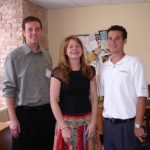When Troy Henikoff entered Brown University in Rhode Island, he had the dream of designing sail boats for a living. He knew he liked to build and create things, but also knew he needed to enroll in a graduate program. The plan was to go to Brown, get an undergrad degree in engineering and go off to grad school.
 While going through the engineering program there, he soon realized that his priorities had started to change. Sailing was no longer the most important thing in the world, and with his senior year approaching, Troy decided to interview with a number of technical firms for jobs. When he received a job offer from General Dynamics he made the trip down to visit the company’s headquarters and witnessed a scene that would change his outlook on business.
While going through the engineering program there, he soon realized that his priorities had started to change. Sailing was no longer the most important thing in the world, and with his senior year approaching, Troy decided to interview with a number of technical firms for jobs. When he received a job offer from General Dynamics he made the trip down to visit the company’s headquarters and witnessed a scene that would change his outlook on business.
During the office tour, he was shown to a floor that was about the size of a football field. The scene that would eventually lead him to work for himself consisted of rows and rows of cubicles, with engineers neatly tucked away in each crevice. The floor below it was the same, as was the floor below that one, and the floor two stories above. The office tour made Troy realize that there was no way he could be caught inside a cubicle, let alone a machine like General Dynamics.
Beyond.com – Free Tools for Job Seekers
So he interviewed with a company in Boston called Design Options because he “liked the name, liked design, and needed an option.” He knew nothing of what the company did, but really liked the experience of going in and designing software for other companies.
Troy was close to accepting their offer when he gave a work connection a phone call in his hometown of Chicago to see if there were any similar openings available. They got to talking about Troy’s past two summers where he had done an excellent job designing a couple of computer database systems, and the connection ended up saying that he needed a new accounting system. He offered Troy the job and encouraged him to go into business for himself.
Troy didn’t know anything about business. He had not taken a business course in school, and didn’t know the difference between a balance sheet and an income statement. The idea was appealing enough to lead him to take caution to the wind and go into business for himself.
So Troy graduated, went to Chicago to meet with his first customer about designing his first accounting system as a businessman,, When he arrived, he was disappointed to find that that the job that was promised to him had already been completed by someone else.
Troy had already lost his first customer before he even went into business. But instead of calling it quits or scrambling to find a job, he decided to stick to his original decision and pursue business for himself.
At 21 years old, Troy started to operate out of the basement of his parents home. He had a thousand dollars to buy a telephone, answering machine, and business cards, but had no computer to program with. At this point, Troy was visiting his clients on-site to program their computers. After about six months, however, Troy started to make the business work. He grew with the customers that needed more systems during their growth stages. He was now in business for good.
Despite his lack of experience, Troy never approached the situation with fear. Instead, it was more of an adventure to him because of the uncertain outcome that surrounded the choice of doing business for himself.
“If you are a person that fears the unknown, go work for a company. Don’t become an entrepreneur.”
In Troy’s entrepreneurial path of starting five businesses over the last twenty years, he says that there are hundreds of lessons that he’s learned along the way. One of which he shared with us regarding the preliminary phases of planning.
“No matter what you are starting, whether a new project, a new company, no matter how well you plan, or no matter how well you think you have it figured out, it’s going to take longer and it’s going to cost more than you planned. No matter what I’ve tried in the past, whether it’s adding a buffer of fifty percent, or doubling the amount of cash I’ll need, I’m always wrong. It always takes longer and costs more. That’s just the nature of the beast.”
Now at Amacai Corporation, Troy is in his first role of running an existing organization as opposed to being the “president, accountant and janitor” of a company he has created. As President, he is veering away from the “knitty-gritty” type of things like programming and selling, but is ensuring that the company has a clear direction and that the entire company understands what the goals are for the team.
Another lesson that Troy stressed was that sometimes the most valuable things in entrepreneurship, and life, are the things that you choose not to do, as opposed to what you choose to do.
“You need to focus on what you pursue. Your success is highly dependent on what you choose to pursue as it is on what you choose not to pursue. Unless you find a customer that will pay you money for something, you will sink a lot of time, energy, and focus into something that won’t help you build your business.”
One of the most humorous responses Troy gave was when we asked the question “How do you define passion?”
Troy’s response:
“It’s like the Supreme Court, I know it when I see it.”
Interview: How I Became President of a Software Company
I was at Brown in Providence, Rhode Island. When I entered Brown my dream was to design sailboats for a living. I knew that I liked to build things and create things, but I also knew that I needed to do a graduate program. There were only four programs in naval architecture and I didn’t want to go to any of those schools. The plan was to go to Brown, get a undergraduate degree in engineering, and then go to grad school.
Pretty quickly into I realized it wasn’t very practical. My priorities in life had changed. Sailing wasn’t necessarily the most important thing in the world to me anymore. So I went through the engineering program without knowing quite what I was going to do with it.
I was approaching the end of my senior year and I started interviewing with all these big technical companies. General Dynamics, those kinds of places. I had a job offer at General Dynamics and went to Crockton, Connecticut and there was this football field sized floor filled with cubicles. They were all engineers. The floor below it was the same, the floor below that was the same, and the two floors above it were identical. I just realized there was no way I could do that. I didn’t want to be part of a cog in a machine.
I interviewed with a company in Boston called Design Options. The only thing I knew about them was their name. I liked design and I needed an option. No kidding. That’s what attracted me. I didn’t know anything about what the company did. Turns out they were a sixty person consulting company doing high tech consulting and development stuff.
I interviewed with them and I really liked them. They had a work hard play hard attitude. You get to learn about companies and develop a system for them and then go do something else. I had a job offer from them and I was about to accept it. But the previous two summers I had been in Chicago and had written some database systems. It was just me and PC in 1985. The ideas of PC had just came out.
Each of those years I had bought computer hardware from a small company called MPK Computing. The guy who owned the company literally delivered hardware out of the back of his car. They didn’t even UPS.
I called him up. I said, ‘Hey Michael. I’m about to accept this job offer with Design Options, but my family is in Chicago. Do you know of a similar outfit in Chicago?’
He didn’t, but he saw the work I had done the last two summers and thought I was going to get a consulting gig. He saw me buying all this computer hardware and thought it would never work. He thought he was going to sell me the hardware and get a consulting fee. Frankly, I did a good job and made customers happy, and his business was growing, so he said, ‘You should go into business for yourself. You don’t have a mortgage. You don’t have kids and bills to pay. You should just do it. You could probably live at home for the first six months if you needed to. And I’ll be your first customer because I need an accounting system done.’
I laughed. I laughed out loud. I didn’t know anything about business. I hadn’t taken a single business course at Brown. There wasn’t a single business course at Brown. But I thought about, and I called him back, and said I was going to do this. This was in April of ’86.
So I graduated and came out to Chicago in May. I go and knock on Michael’s door and ask him about the accounting system. He goes, ‘Oh yeah! I should show it to you! We’ve got 8 employees now and I got this great new UNIX accounting system.’
I had already lost my first customer before I even went into business. But I decided to do it anyway. He was helpful because his business grew and we did a bunch of work for him. His first credit card processing program. He had a frequent buyer program. He did all kinds of stuff. And as customers came to him, they didn’t know anything about computer software and needed a computer system. He’d say that he could provide the hardware, and that he has this guy, originally it was ‘this guy’ but we grew, that could write the software for me.
About fifty, sixty, seventy percent of customers in the first year or two came from them. That’s how I got into business as someone without any business experience at 21 years old. I didn’t know what I was doing. I lived at home for the first six months and operated out of the basement until I could afford an office. All I had was a $1,000 of savings. I didn’t even have a computer at first. I worked on the clients computers. I went to their office and programmed. I had enough money to get a telephone and business cards and an answering machine and to cover incidental costs.
The interesting part of that story is that he grew. His business grew and after about four or five years he changed the name from MPK computing to Computer Discount Warehouse and became CDW, and has now become a $6 billion a year corporation.
That business that I started I actually ended up selling and it doesn’t exist today. But for the first seven or eight years, we did a lot of work for them. There were a lot of other clients that we latched onto early that we grew with.
Was there fear?
I would not say there was fear. Was there uncertainty? Yeah. That uncertainty is what made it interesting and fun. I wouldn’t say there was fear. And again, I was fortunate that I didn’t have school loans to pay back. I literally did live at parents house for 9 months and used their basement as my office. So I had very little financial obligation. It was quite an adventure.
It was slow at first, but it took about ninety days until I had my first real contract. I thought it was a big deal. I was doing little projects here and there, and then I got so busy I had to bring on someone else to help. Then we had to bring on two more people a year later. I was doubling every year and I thought that was crazy. I went from one person to two people in a year. Then to four. Then to eight. This is all before venture capital and the internet bubble. Doubling every year seemed like crazy growth. And it was crazy. And it was all funded by revenues.
So to answer your question, it wasn’t fear, but there was always a sense of adventure and the unknown. I definitely like that. I thrive on that. If you’re someone who doesn’t like the unknown, go work for another company. Don’t be an entrepreneur.
Do you consider yourself an entrepreneur?
Oh yeah. That’s all I’ve ever done.
What’s the biggest lesson you’ve learned in entrepreneurship?
There are hundreds of them. If I had to give a single one, it’s that no matter what you’re starting, whether it’s a new project or a new company, no matter how well you plan and budget, it’s going to take longer and it’s going to cost more than you planned. I’ve started four or five businesses over the last twenty years. Each time I start one I think I’m experienced and figure out how long it will take. I’ll add a buffer of 50%. I thought it was going to cost this much and I’ll double how much cash I’ll need. I’m wrong. It takes longer. It costs more. It always does. That’s just the nature of the beast.
You need to make sure to have enough buffer and contingency, on top of your buffer and contingency, that you can make it through. Most businesses fail. The majority of businesses fail because they run out of cash.
You’re the president here. What kind of leadership qualities do you focus on to make your company better?
Here at Amacai, this is the first time I’ve ever come in to run an existing organization. I was recruited to come in to run an existing business. It’s still fairly entrepreneurial. Depending on how you count, we’ve got 60 employees in the U.S and a couple hundred in Costa Rica. It’s still a small business.
My role here is, I’m not doing. In my first custom software business I was president, programmer, janitor. Doing it all right. And as I brought people on I’m training them and teaching them and leading them. But still I’m actively doing it. Frankly, I was one of the best programmers and problem solvers we had. Because I was doing it the longest. I knew our systems the best.
Here I’m coming in, and Amacai’s business is selling data. I don’t really know much about the data industry. I’m not going to be our best salesman and I’m certainly not going to be a programmer. I’m not as hands on in the nitty gritty. My role is to make sure we have a clear direction and make sure everyone understands what the goal is of the team. Understand what our goals are, and make sure we are pushing in the direction.
This is a good lesson for entrepreneurs. Even more than what you choose to do is what you choose not to do. Concrete example. Today we had a discussion and one of our partners has some data on consumers and their previous addresses, and thought it would be great if we could integrate that into our database. We could have spent months, maybe years trying to integrate this idea into a system. But we don’t have a single customer who has told us that they’re willing to pay for this. Why would anyone go down that line?
So I put the presses on and said, ‘Guys stop. We are not going to pursue this. We need to be focused on what we pursue and our success is highly dependent on what we choose not to pursue. Unless you come up with a customer who is willing to pay us money for this, this is going to sink a lot of time, energy, and money into something that isn’t going to build our business. Let’s not do it. Let’s focus on things that will build our business.’
In January, Amacai does an off site kick off. We were in Kri Largo this year, where we take the whole company off site. There are only three things I want to do this year. I want to focus on our strengths, I don’t want to be everything to everybody, and I want to execute, execute, execute. Because at the end of the day it’s typically the company or the organization that executes the best that wins. Ideas are a dime a dozen. But you have to be able to execute against them. And that’s what wins.
My role at Amacai is one of making sure that everyone is focused, pulling in the same direction, and sees where we’re headed. They’re doing all the work. I’m not doing any of the work. I say that kind of sarcastically. But we’re above our goals, we’re hitting projections on sales, and I can’t take any credit for it. I didn’t make the deals and get the contracts signed. Those are the sales people. It’s the people in operations that deliver the files. They’re the ones who did all the hard work. But hopefully I enabled them to work together and stay focused so we accomplish our goals.
How do you define passion?
How do I define passion? I’m like the Supreme Court. I know it when I see it.
I think you have to have passion and I always look for passion for people I hire. I think it drives you through a lot. How do I define passion? I’ve never thought of that before. It’s a drive, it’s a willingness.
Everything is going to have it’s ups and downs. Whether it’s a business, a relationship, you’re involved in sports, you’ll have ups and downs. The people that are passionate are driven to get the outcome they want and are willing to drive through those down periods and do what it takes to get there and succeed in their goals.
I find that there is a high correlation between people who are passionate about their work, and people that are passionate about other things in general. Particularly sports. For instance, I’m a competitive cyclist. I race. The guys I ride and race with, literally one day I was riding in a pack of 25 guys and I looked around and realized 80% of them were entrepreneurs in one sense or the other. One guy was a dentist with his own practice. Not your particular thought of an entrepreneur, but it’s guy who wants control of his own destiny and it’s him running the show. There’s a guy in real estate who’s on his own. There’s a couple guys who have big businesses. Michael Krazney, the guy who started CDW rides.
There’s just a competitive drive that seems to transcend your entire life. People get involved. I use to run marathons. I was very competitive at that. I have to have something competitive like that, not only in my work life, but in my competitive life as well. I think that’s an indication of passion, and you see that in a lot of people.
What do you think the biggest obstacle you’ve had to overcome in business is?
Initially it was not knowing enough about business. I graduated with a degree in engineering and I did not know the difference between a balance sheet and an income statement. I knew how to balance a checkbook. But two years in to running this business, I was interviewing this guy coming out of Northwestern. He was like, “I really like the opportunity and you’ve told me that you’re going to pay me this salary. I’m a little concerned with how stable the business is. Can I see your balance sheet?’
My balance sheet? Like in the back of my checkbook? I don’t know what a balance sheet is. We were growing our business, we hadn’t had to go to a bank to borrow money. We didn’t have any need for that. So pretty quickly as the business grew beyond two of us we realized we needed a little bit of help. I hadn’t had any management courses or any accounting, so I ended up going to the evening program at Kellogg and work towards an MBA to get some of those skills.
I actually didn’t finish the MBA because I took the half dozen classes that I really needed, and I was too busy getting a real life MBA that I didn’t really care about some of the requirements. In hindsight I should have finished it then. It would have made some things easier. But I just took what I really needed and it helped tremendously. And know I do know the difference between a balance sheet and an income statement.
What are students missing out on?
I teach a course in entrepreneurship at Northwestern. People come into the course not understanding just how hard it is to start a business. I’m not exaggerating when I say there were multiple times where I put a 100 hours into the business in a week. There are only 168 hours in seven days. If you back up the math, it’s how much do you want to sleep a night? Multiply that by seven. You gotta eat. It was hard. It was literally fourteen hour days, seven days a week. You can’t do that sustained, but you did it when you needed to get a project out.
It takes passion to do that. You don’t do that if it’s just a job. And I think that people who think about entrepreneurship think about the glory. They think about Michael Dell and Bill Gates. But that’s like two people. Think about how many people have tried and failed, or tried and not have been as successful on that scale. It takes a lot of hard work.
If it were easy, you’d see everyone doing it. It takes a lot of hard work. When I teach my class, I tell them the first day that this is going to be the hardest class you’ve ever taken. In the end, in the reviews I get, generally they say it was the hardest class they’ve taken. They put more time into this class than any other class they took at Northwestern. Most of them loved it. Few of them didn’t.
I also say that one of the greatest things that can come out of this class is knowing that you don’t want to be an entrepreneur. That way you don’t have to waste your time and you can go do something else. But I don’t think people realize just how hard it is.
And what’s your motivation for doing it? If your motivation for doing it is you want to be like Bill Gates and getting rich, then you know what? The odds are better at buying a lottery ticket. Think about it. Each week, each state in the union has a lottery with a million dollar pot in it. I might be wrong, but there are probably fifty millionaires created every week by the lottery. How many millionaires do you think are created every week from entrepreneurship?
We can name a handful that we created over the last ten to twenty years. And you know how bad the odds are a






